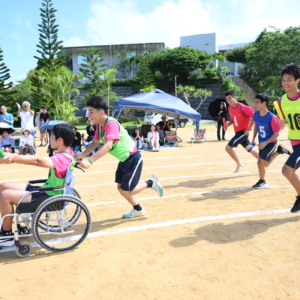At Okinawa Amicus, our school librarian shares a monthly update with all staff, summarizing the achievements of our students and alumni as featured in the newspaper. For someone like me, who rarely has time to read the paper in detail, this regular update is truly valuable, helping me catch up on many inspiring stories that I might otherwise miss.
These updates also include accomplishments of Amicus alumni. In today’s distribution, for example, there was an article highlighting Amelia Wolf (Okinawa Shogaku High School), who won first prize in an English speech contest, and Keichi Yasunaga (Kaiho High School), who received top honors in an essay competition (Okinawa Times, 10/30). Yasunaga’s essay, titled “The True Meaning of Happiness,” took up nearly half a page and was deeply insightful. Reading it provided me with a valuable learning experience.
In his essay, Yasunaga writes about his experience studying abroad in Denmark, a country known for its high level of happiness. He describes how he was often asked questions by his host family, such as, “What would you like to do this weekend?” Despite their good intentions, he found himself unable to answer right away. Reflecting on this, he explains that, in Japan, he had grown accustomed to following instructions from elders, which led him to struggle with making his own decisions. He also observed that, unlike in Japan, where schools are seen as “places where students take lessons,” schools in Denmark are “places where students actively engage and take charge of their own learning.”
To foster independence, one needs to practice making small everyday decisions independently, such as “How will I spend my weekend?” “What do I want to eat?” or “How should I organize my daily schedule?” It is equally important to take responsibility for the decisions made.
Reading this article reaffirmed the importance of Amicus’s educational philosophy, which focuses on developing the skills and qualities our students will need in the future. Amicus’s educational principle is to cultivate “independent children who think, learn, and act for themselves, and who carve out their own futures.” Yasunaga suggests that this way of life could very well lead to true happiness.
Yasunaga’s essay also includes a quote from Mr. Saigo: “The most important thing for a school is that students are happy.” For students to find happiness, they need the ability to think, learn, and act independently. I am more convinced than ever that Amicus’s educational approach is leading us in the right direction.

